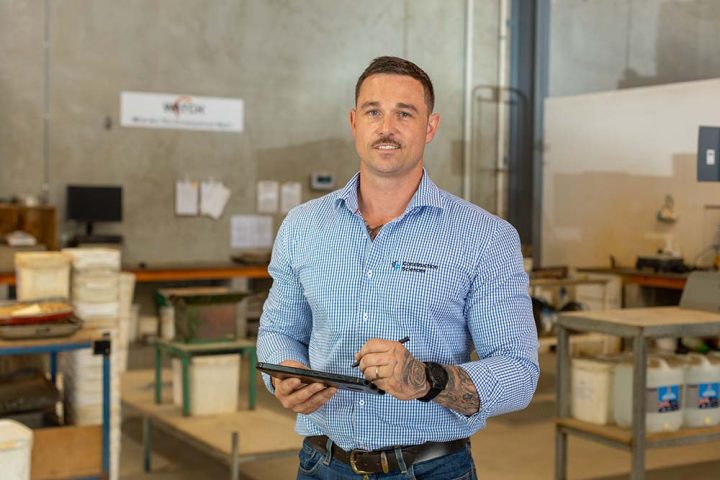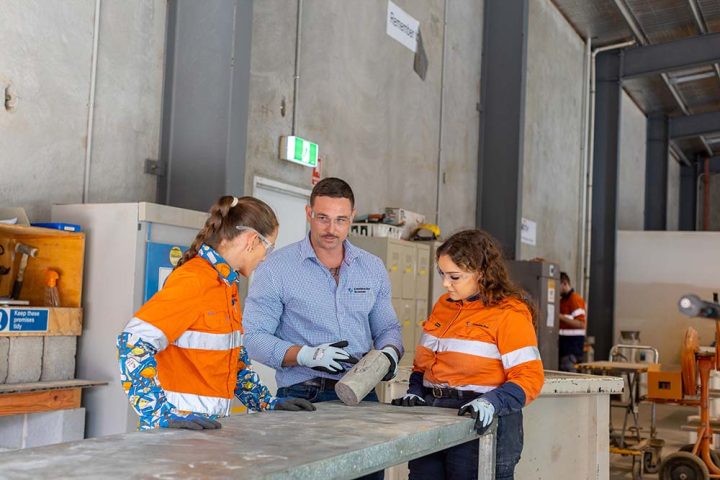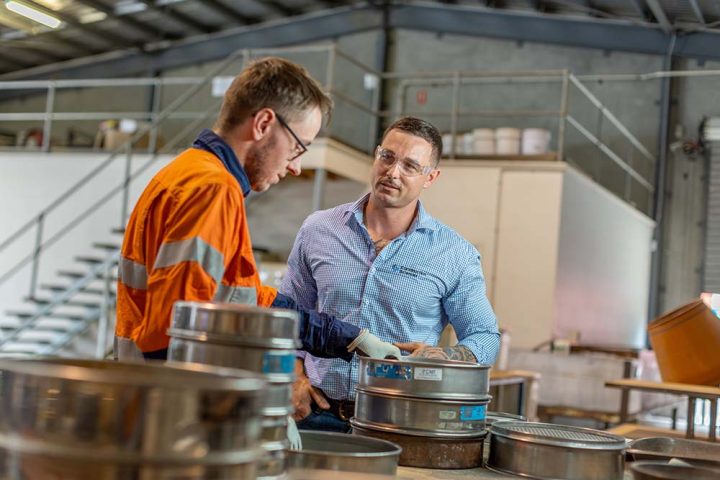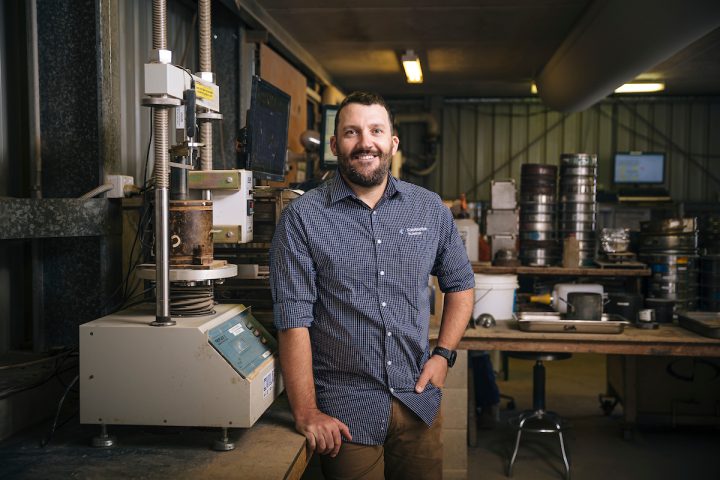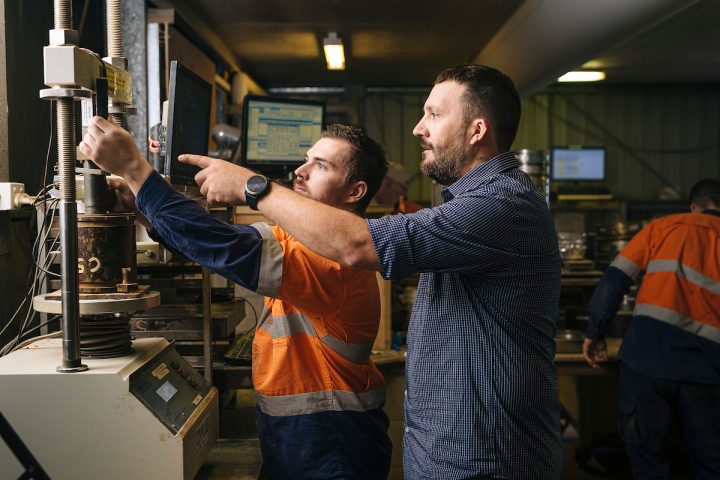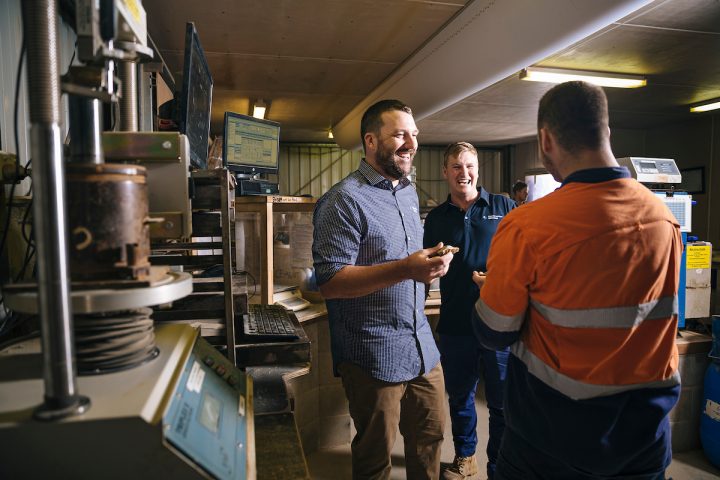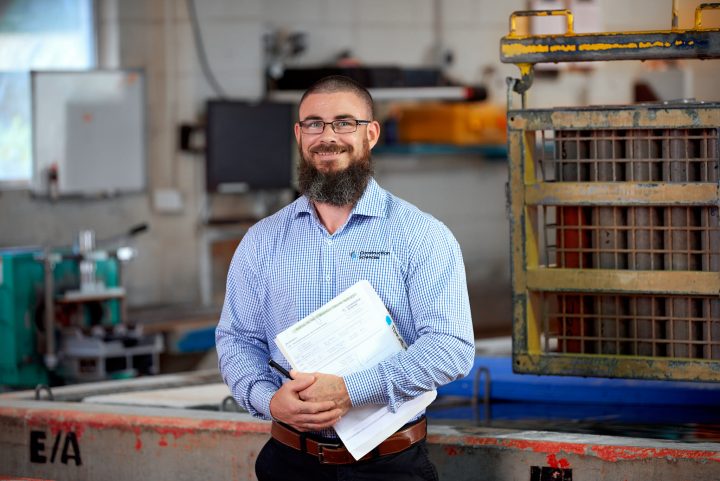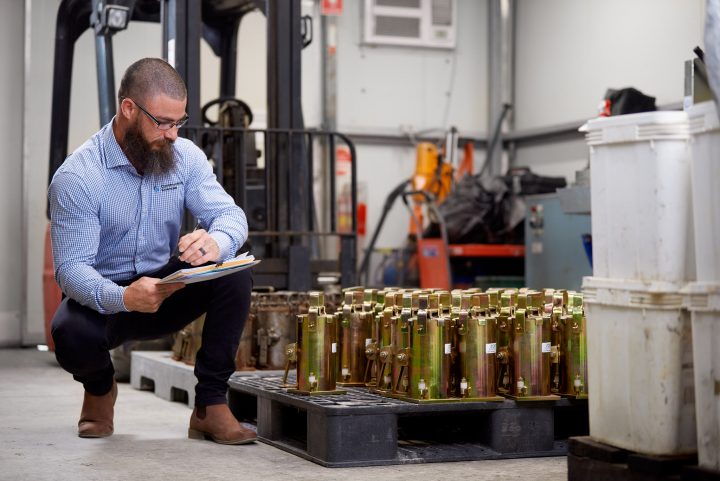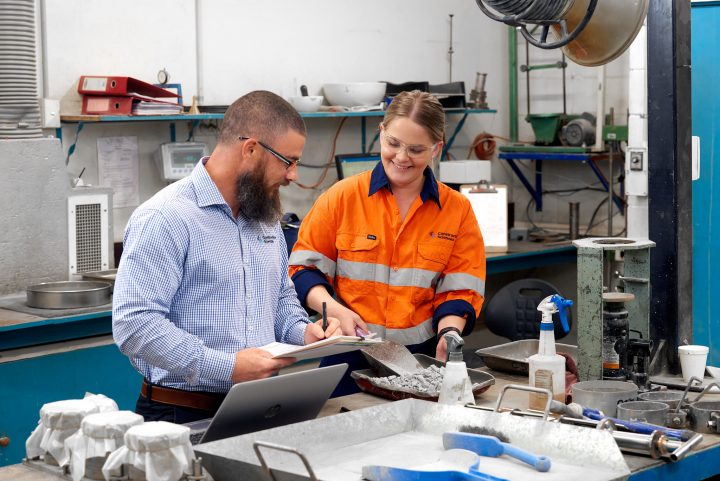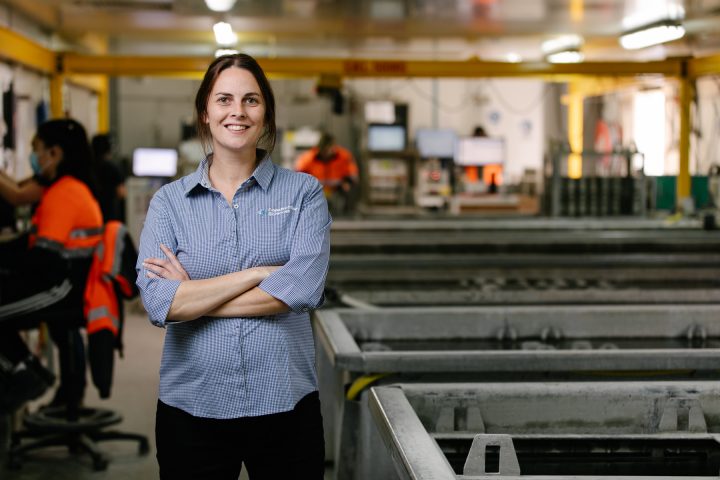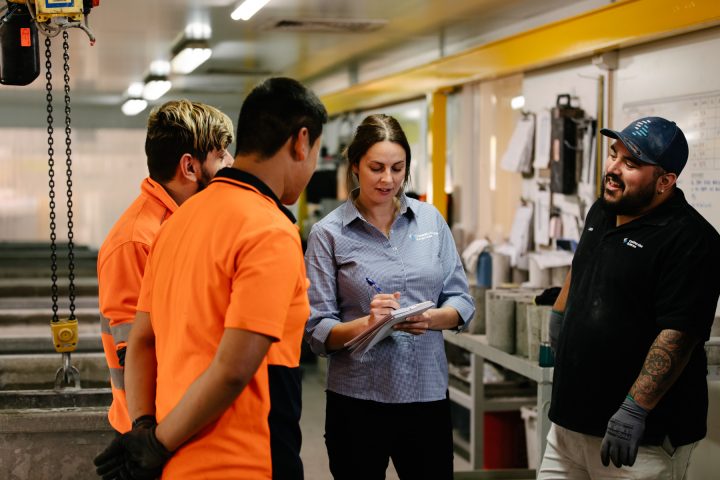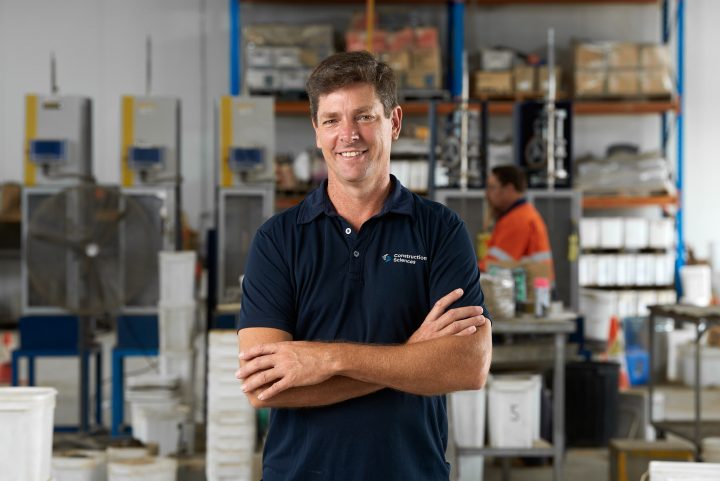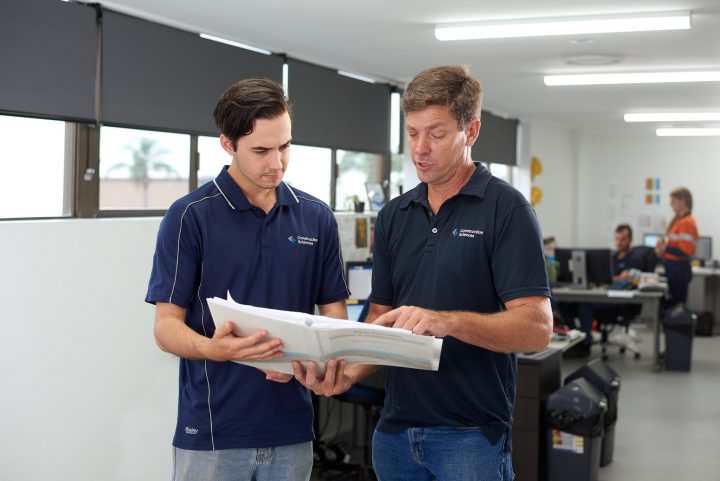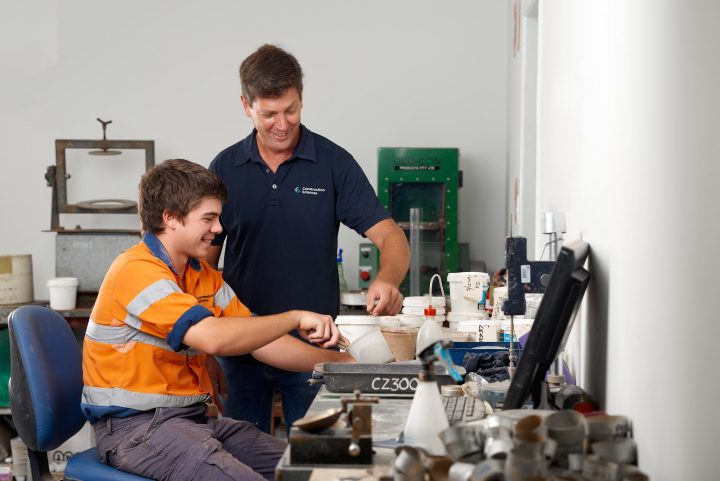Tai Battisson – Area Manager, Central Queensland South
Q: How long have you been involved with the company?
A: I started with the company in 2012, formally known as Cardno Roadtest. After completing a nine month project in Moranbah I moved west to join Cardno Geotech (WA) in 2013. I spent approximately six years in WA managing site laboratories across the Pilbara and Kimberley region.
In 2019 it was time to hang the boots up on the FIFO lifestyle, so I accepted a role as Laboratory Manager in Gladstone, Queensland.
In May 2022, I was promoted to Central Queensland South Area Manager and relocated to the Rockhampton facility.
Q: What is a typical day for you as an Area Manager?
A: My day starts with reviewing and corresponding through emails, internal and external and supporting the Laboratory Managers where needed. I also provide training to staff to ensure that all QA and laboratory compliance is completed within the required timeframes.
Once this is complete, I am on the tools working alongside the technicians in the Rockhampton Laboratory assisting with soil, concrete, and aggregate testing.
Q: What was your journey like to get to where you are now?
A: The journey has been a long road, however, I am fortunate to have experienced many aspects of the construction materials testing (CMT) industry during this time. Starting in 2002 as a 16-year-old trainee, I moved through the ranks to senior technician in 2007, and began managing laboratories in 2012. I also spent several years on drill rigs, classifying house sites and boring for environmental testing. This experience gave me a great understanding of soil properties later in my career.
Q: What has been one of the biggest learning curves of your professional career?
A: I pride myself on being a smooth operator, however once I moved into management, some of the learning curves I experienced and was unfamiliar with at the time were managing staff on different levels from technical abilities through to mental and emotional levels. Understanding the staff and their background experiences (present and past) that may affect their day-to-day duties, and ability to perform in certain environments is important to the efficient and effective operation of a laboratory.
Q: What is the best thing about your job?
A: There is nothing more rewarding than positive feedback from clients. Quoting and being awarded projects off the back of pricing is one aspect to working with clients. The experiences of working on a project and delivering milestones for clients all helps to build the relationship. Delivering results on time and maintaining client satisfaction is the key to success.
Also, in my career journey for Construction Sciences I have enjoyed watching technicians transform from trainees to senior technicians and go on to manage laboratories across Australia.
Q: Any advice for people looking to start a career in the construction & engineering sector?
A: My advice to trainees entering the CMT industry is to be patient and absorb as much knowledge as possible during their years as a technician. CMT is an industry packed with endless opportunities for people who take pride in their work, act with integrity, and continue to learn and upskill to build upon their experience.
Peter Gode – Area Manager, Townsville
Q: How many years have you been with the company?
A: I have been with the company for 15.5 years, I started in July 2005.
Q: What is a typical day for you as an Area Manager?
A: My typical day consists of quoting projects, communicating with staff and helping out where needed, contacting clients ensuring our level of service is of a high standard.
Q: What was your journey like to get to where you are now?
A: I originally started as the driller for the Townsville lab drilling house site classifications, 12-18 months after starting on the drill rig I started to train in laboratory/field testing locally in the Townsville region.
2008 was my first Annex Manager’s role and in October 2010 I applied for the position of Laboratory Manager.
From October 2010 to March 2016 I was running the Townsville Laboratory handling all local works. Through this time as a lab manager I was mentored in multiple areas of the business helping to quote major projects, staff management, cost control and business development. I was then given the opportunity to apply for the Business Unit Manager’s role, fortunately for myself I was lucky enough to be awarded the position.
The NQ team has grown significantly the past 5 years and all staff within the area have helped. I can honestly say that without the support, training and mentorship from people within our business I would not be in the position I am today.
Q: What has been one of the biggest learning curves of your professional career?
A: Budgeting and Forecasting was my biggest learning curve, however I had a lot of support from both the management and financial team in our head office to help me. One massive advantage we have over our competitors are our people including our management team, there is always support available.
Q: What is the best thing about your job?
A: The challenge of trying to win projects, I am a very competitive person and winning projects means staff will have jobs and our business will continue to grow.
Q: Any advice for people looking to start a career in the construction & engineering sector?
A: Construction Sciences can give anyone a chance to climb the ladder if you are prepared to put in the hard work. Never take anything for granted because you never know where you could end up.
Shannon Grant – Quality & Training Officer, Gold Coast
Q: How many years have you been with the company?
A: I started with Bowler Geotechnical in 2003, 18 years.
Q: What is a typical day for you as an Quality & Training Officer?
A: A typical day usually involves responding to quality/technical queries, planning and completing audits, assessing conformance against quality objectives, maintenance of the Quality Management System.
Q: What was your journey like to get to where you are now?
A: I started my career working in various laboratories across Australia from 2003 to 2011. During this time I was given the opportunity to complete a Certificate IV and Diploma of Laboratory Operations.
2008, I completed an Advanced Diploma in Laboratory Techniques which gave me the drive and knowledge needed to push my career in the direction of Quality Management.
2012, management gave me the opportunity to implement my knowledge of Quality Management and Laboratory operations across multiple laboratories as the Quality Manager and Authorised Representative for Western Australia.
2013, I completed a Diploma in Quality Auditing across three international standards (ISO/IEC 17025, ISO/IEC 9001 and ISO/IEC 31000). This gave me the knowledge to implement the principles and framework needed for an effective Quality Management System.
2016, I was fortunate enough to join the Quality and Training Team as a Quality and Training Officer where I support the team in the implementation and maintenance of the companies integrated management system.
During my time with the company, I have had many great mentors which gave me the tools and opportunities to get to where I am today.
Q: What has been one of the biggest learning curves in your professional career?
A: Having self-efficacy in my ability to achieve desired outcomes in and outside my areas of expertise.
Q: What is the best thing about your job?
A: I have many, but if I had to pick one, it is knowing that I work within an organisation that has the tools and support for those wanting to progress not only in the company but in the industry.
Q: Any advice for people looking to start a career in the Quality sector?
A: Learn to map requirements to the source and understand why these are requirements. Apply a risk based approach by using risk based thinking. Treat Everyday tasks as an opportunity to upskill.
Jessica Kubeckis – Lab Manager, Melbourne
Q: How long have you been involved with the company?
A: A total of 13 years.
Q: What is a typical day for you as a Laboratory Manager?
A: I start my day checking on the allocations to see if any issues have popped up overnight, I then look for the early age concrete results and ensure they are out the door by 7.00am. After the initial rush it involves looking at what needs to be shipped out for the day and sorting the daily charges or reports going out to clients. Some duties are quality focussed, like responding to a CPR or checking the repeatability test results that we do weekly.
Q: What was your journey like to get to where you are now?
A: I was initially employed in a Receptionist / Data Entry Role, and then my manager encouraged me to upskill and gave me the opportunity to undertake a Cement Concrete and Aggregates Australia Training course.
As my interests and experience grew I was able to see the direction I wanted to progress in, so I took the opportunity to train with the Concrete Laboratory team in the Concrete Compression, Trial Mixing and Field Testing areas to gain a full understanding of the day to day procedures, test methods, sampling procedures and concrete behaviours.
I was then able to use these skills to progress into roles such as Concrete Allocation and become part of the manager’s support team. During this time, I was trained on the quality management systems, the audit system and calibrations. In 2019 I completed my Diploma of Laboratory Technology this gave me an easy transgression into the Laboratory Managers position I am currently in now.
Q: What has been one of the biggest learning curves in your professional career?
A: My biggest learning curve has been the step up into my current role as Laboratory Manager. This is requiring me to apply my current skill set whilst quickly learning the expectations of this role, this includes such things as Quality management, people management and NATA.
Q: What is the best thing about your job?
A: The diversity of the work, the ability to ensure the client is satisfied with the services they are provided with, achieving the completion of the day work and assisting everyone too.
Q: Any advice for people looking to start out in Testing?
A: – Use the people around you as your resource
– Be open to new opportunities
– If you’re interested in a particular role ask your manager on what is required to get there
– As a woman don’t just assume your not suited for the task because it is perceived as a men’s role
David Dethlefs – Environmental Consultants Manager, Brisbane
Q: How many years have you been with the company?
A: I first started working as a casual university graduate in 1997 doing a mix of soil testing, acid sulfate soils drilling investigations, laboratory chemical testing and assisting in writing Acid Sulfate Soils (ASS) management plans.
Q: What is a typical day for you as the Environmental Consultants Manager?
A: I’m still very hands on with the work we do in the SEQ area, so I might have to go to site for a meeting, or for an inspection, or to take a water sample, or to setup monitoring equipment. I write and review a lot of reports, do tender proposals. I provide guidance to our Environmental Team and assist lab managers across the country to provide environmental services to their customers. Other common tasks involve delegating work, mentoring the less experienced enviromental technicians, liaising with clients & performance review of the business units.
Q: What was your journey like to get to where you are now?
A: Despite starting as a tech, I already had a Built Environment degree at the time. When I started getting experience on projects, Acid Sulfate Soils were a relatively new issue, and I was involved with the sampling, testing, and management of the ASS on site. I went to a project with another testing company after finishing up a large project, but when I returned I was encouraged by management to build the environmental monitoring part of the business. We built that part of the business while I was still largely working as a soil tech. Progressively, it took over my whole day and grew to where we needed to hire additional environmental technicians and engineers.
Q: What has been one of the biggest learning curves in your professional career?
A: I think that setting up the Enviromental Consulting business was very much a steep learning curve.
Q: What is the best thing about your job?
A: The work involves great variation of day to day tasks. It is good to break up your day by getting out to site and getting out to wide and varied work environments. I might be water sampling in a creek one day, or setting up vibration monitoring in the city the next.
Q: Any advice for people looking to start a career in the environmental engineering area?
A: Consider working outside your comfort zone for a while. The knowledge and experience that you get from working on sites seeing a project from start to finish in invaluable. There were very limited opportunities in the ‘90s when I started out. By taking up the testing opportunity, it lead to a lot of major infrastructure project experience, which in turn lead to the opportunity to develop a business more in the field that I wanted to be. Also, if you want to be considered for management roles, put your hand up i.e. ask.

